Samsung Series 7 NP700Z7C Review
by Jarred Walton on August 16, 2012 2:05 AM ESTSamsung Series 7 General Performance
We start as usual with our general performance application benchmarks. We’re reaching the point where we now have quite a few notebooks in our updated Mobile Benchmark suite, and we’ve tried to select some reasonable comparison points. Here’s the list of laptops we’ll be using for our charts, along with a brief overview of their specs; note that the Dell XPS 15 results are still “preliminary”—we’re still hoping for a BIOS update that will improve the overall experience without requiring the use of utilities like ThrottleStop. Also, the ASUS N56VM/N56VZ we previewed used different hardware than what currently ships, specifically it has a Fermi-based GT 630M instead of a Kepler-based GT 650M. The full specs for each laptop can be found in their respective reviews, which we’ve linked in the table below.
| Laptop Configuration Overview | ||||
| Laptop | CPU | Graphics | Storage | Battery |
| Acer Aspire V3-571G | Intel i7-3610QM | GT640M/HD4000 | HDD | 48Wh |
| Acer Aspire S5 | Intel i7-3517U | HD4000 | SSD | 35Wh |
| Acer TimelineU M3 | Intel i7-2637M | GT640M/HD3000 | SSD | 55Wh |
| AMD Trinity Prototype | AMD A10-4600M | HD7660G | SSD | 56Wh |
| ASUS N56VM (Prerelease) | Intel i7-3720QM | GT630M/HD4000 | HDD/SSD | 56Wh |
| ASUS G74SX-A2 | Intel i7-2630QM | GTX560M/HD3000 | SSD | 90Wh |
| Clevo W110ER | Intel i7-3720QM | GT650M/HD4000 | Hybrid (Seagate) | 62Wh |
| Dell XPS 15 (Preliminary) | Intel i7-3612QM | GT640M/HD4000 | Hybrid (SRT) | 65Wh |
| Razer Blade | Intel i7-2640M | GT555M/HD3000 | SSD | 60Wh |
| Samsung Series 7 17.3” | Intel i7-3615QM | GT650M/HD4000 | Hybrid (ExpressCache) | 77Wh |
| Sony VAIO SE | Intel i7-2640M | HD6630M/HD3000 | HDD | 49Wh |
| Toshiba P755D | AMD A8-3520M | HD6620G | HDD | 47Wh |
We have quite a few SSD-equipped laptops in our list, which will mostly influence the PCMark results. As mentioned already, the Samsung Series 7 uses Condusiv Technologies’ (formerly Diskeeper Corporation) ExpressCache software to provide SSD caching, but the end result ends up feeling more like a hard drive than an SSD—though whether that’s the small 8GB SSD or the software itself is difficult to say. The Dell XPS 15 we reviewed last month uses Intel’s SRT and definitely felt more like an SSD, and even Seagate’s Momentus XT (also with 8GB of cache) can help compared to a straight HDD. The $5 saved by going with the HM76 instead of HM77 doesn’t look so good when we see the impact it has on general performance.
Note that once again, we’ve run PCMark 7 using Intel’s IGP as well as the NVIDIA dGPU; the presence/lack of Intel’s Quick Sync technology can have a sizeable impact on the overall PCMark score, and in particular the Entertainment, Creativity, and Computation scores are affected. For the other laptops, we’ve used the best score for each chart (e.g. IGP for the Computation results). The Series 7 results are in green, with the similarly equipped Dell XPS 15 results in yellow. We also have results for the ASUS N56VM/N56VZ prototype with both HDD and SSD (light blue) storage, so you can get a feel for the range of performance that the storage solution creates.
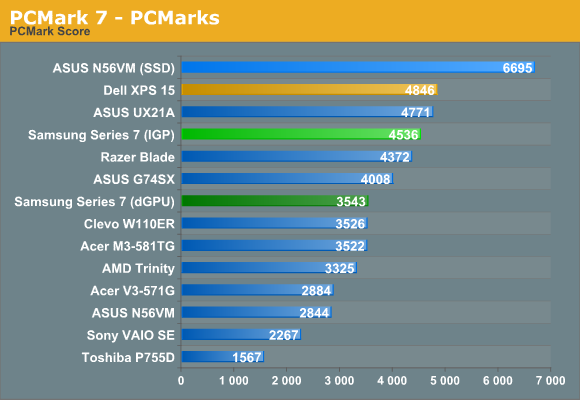
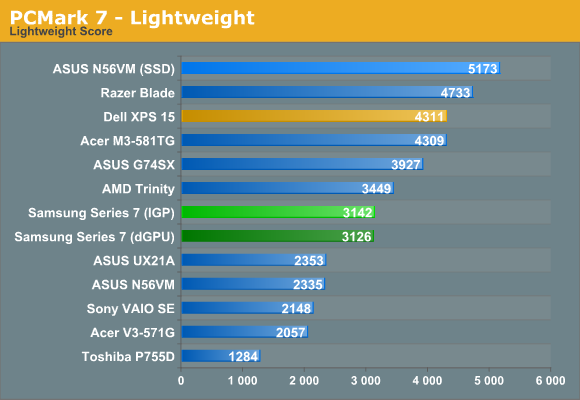
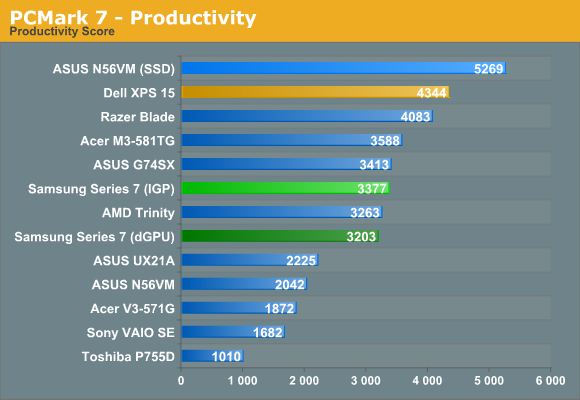
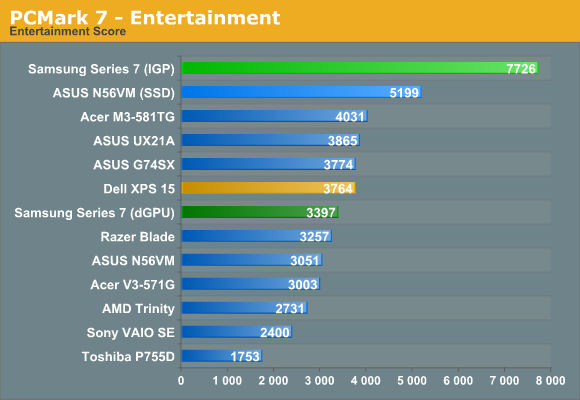
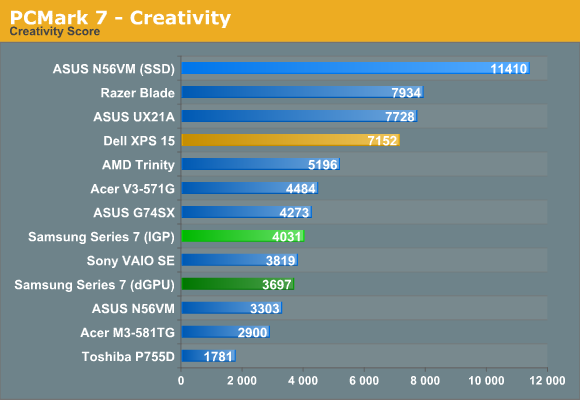
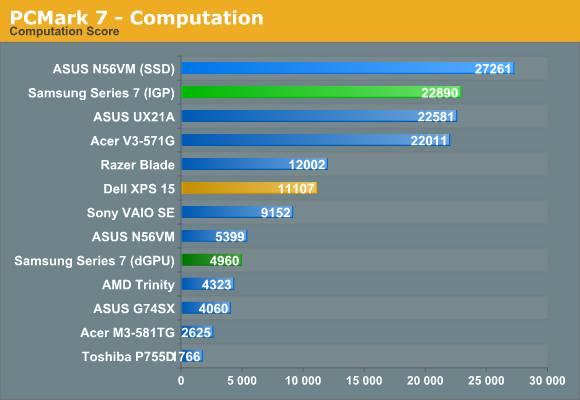
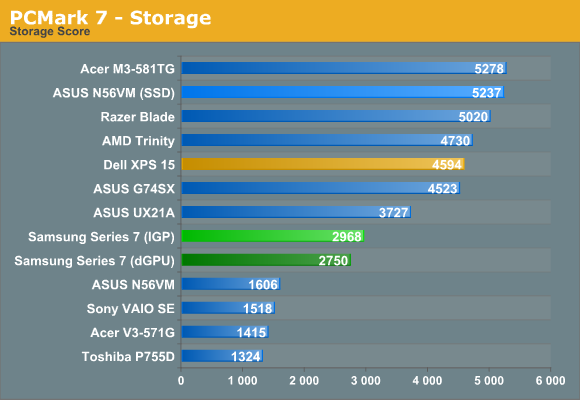
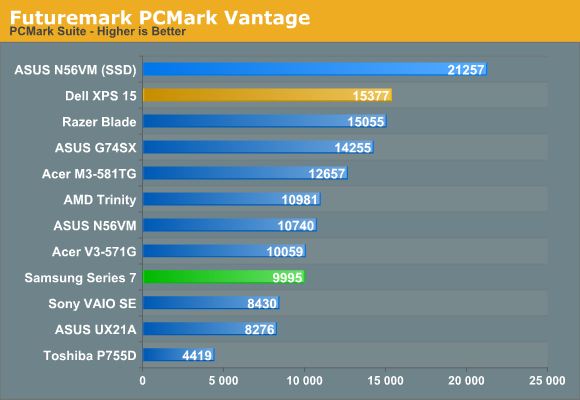
The overall PCMark 7 scores looks pretty competitive, coming in just below the similarly equipped Dell XPS 15. However, that’s not the whole story, and when we drill down into the individual scores we get a better idea of what’s going on. For whatever reason (possibly drivers), Samsung’s Series 7 notebook scores exceptionally well in the Entertainment test, and it also generates the expected ~22K score in the Computation suite. Both suites heavily leverage Intel’s Quick Sync technology, but the XPS 15 results are rather low by comparison while other scores are higher (thanks to a faster storage setup). Acer’s V3 is in a different dilemma, with no solid state storage, and that really puts the brakes on in PCMark 7. It’s a decent start for Samsung, but the Storage subtest shows what we mentioned earlier with a score much lower than any of the other SSD/SSD caching solutions.
PCMark Vantage in this case is potentially more useful, as it doesn’t skew so badly with Quick Sync (and Intel IGP drivers). Here the Samsung actually just matches the Acer V3, which is pretty telling considering they have similar hardware other than the GPU and SSD cache. For that matter, Acer’s use of a 5400RPM Toshiba drive makes it one of the slowest in terms of storage. In short, while some tests show the Samsung Series 7 storage coming in much faster than a plain old HDD, in practice we felt it was often only marginally better than an HDD.
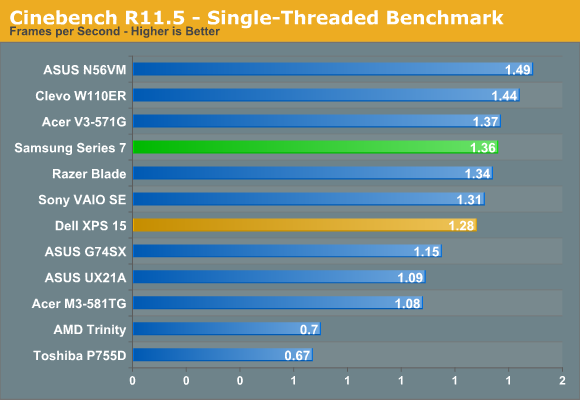
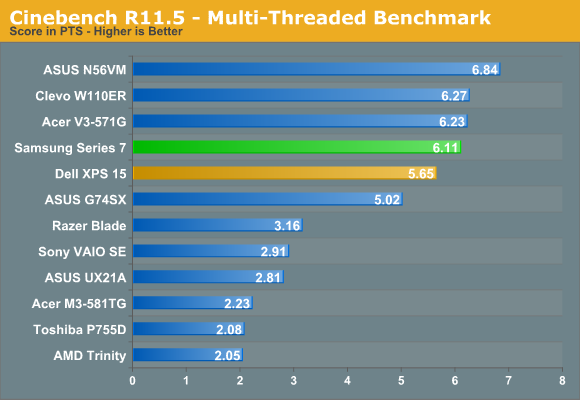
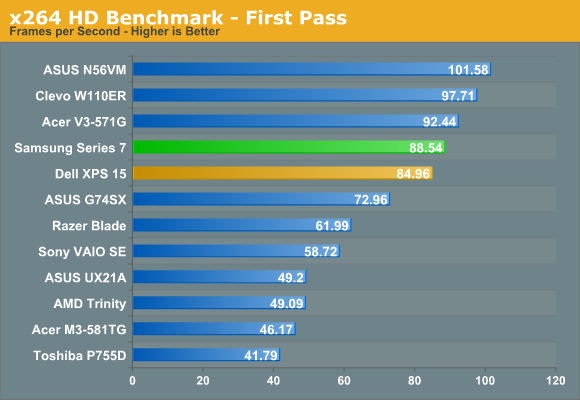
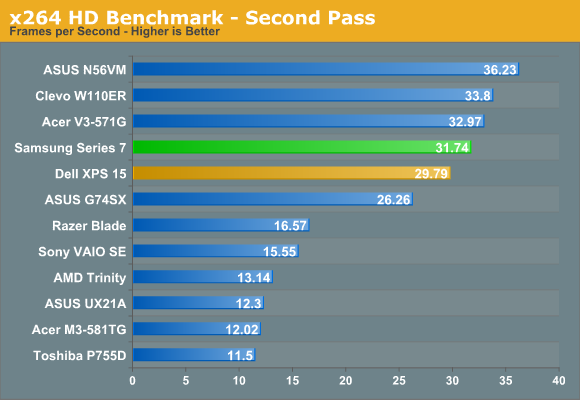
Our CPU-centric tests are interesting as well, with the Samsung scoring about where expected but still a bit slow. Acer uses an i7-3610QM processor with the same clock speed range as the i7-3615QM, and yet it ends up faster in all of the CPU tests. It’s not that Samsung is throttling; it’s just not quite as optimized and can’t hit max Turbo Boost as often as some of the competing laptops. If you need every ounce of CPU performance, there are obviously faster laptops and notebooks out there, but for most consumers any of the quad-core Ivy Bridge processors will be more than sufficient (and perhaps even overkill).
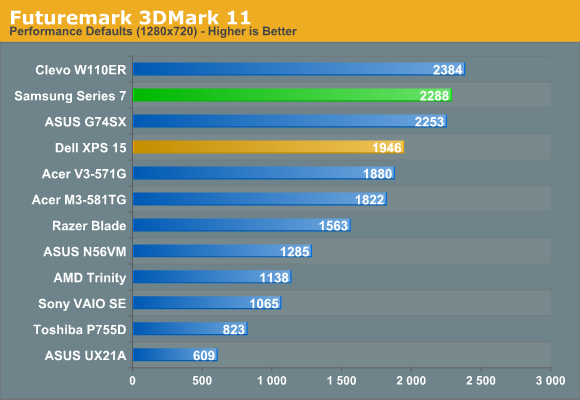
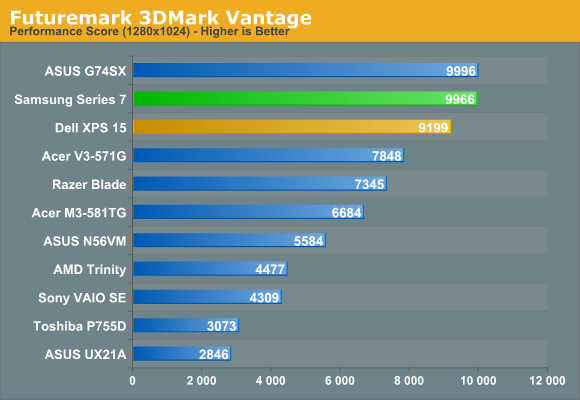
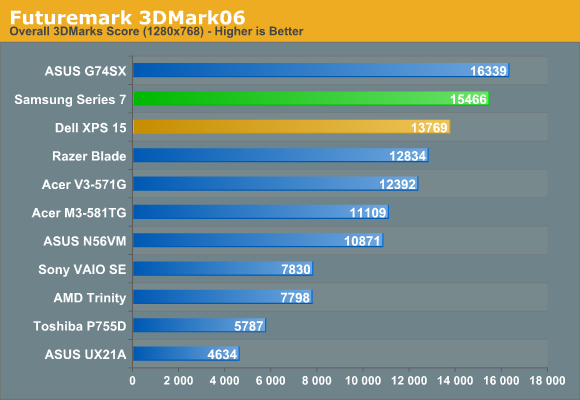
We wrap up our initial application performance with a quick look at 3DMark, and here the GT 650M is able to put in a showing. Clevo uses the same GPU in their W110ER, only with DDR3 memory. 3DMark11 doesn’t appear to mind the lack of bandwidth, but we’ll see in a moment how that carries over to actual gaming results—at lower detail settings/resolutions it shouldn’t hurt, but in particular 1080p gaming will benefit from the presence of GDDR5. Also as expected, the GT 650M GDDR5 is consistently faster than the GT 640M GDDR5 in the XPS 15.










50 Comments
View All Comments
creed3020 - Thursday, August 16, 2012 - link
"Dell XPS 15 results in yellow"The yellow bars show the Aver V3 and not the Dell. The Dell laptop has the standard ark blue colour.
JarredWalton - Thursday, August 16, 2012 - link
Fixed, thanks.npaladin2000 - Thursday, August 16, 2012 - link
I own a 15 inch version of the previous generation, these are excellent machines, but yes, an enthusiast will not be satisfied with it as-is. I ended up throwing in a 512 Gb SSD and an Intel A/B/G WiFi card. Getting into these is NOT easy, so I'm not looking forward to any equipment failures, but these things are solid, compact, quiet, with a good layout, blowing all the exhaust to the BACK, as it should be. And I have to say the keyboard is the best one short of a Thinkpad that I've ever used.Never knock sleek and thin, particularly if you have to travel with the thing. I went from an Asus N53SV to this, the Asus was a real pain anywhere except at home on my desk, and on the occasional hotel desk (took up a lot of room there). The Series7, even the 17 inch, is a much more desirable travel companion.
Samsung just needs to make service easier somehow.
knekker - Thursday, August 16, 2012 - link
Right now i am just waiting for a 17inch laptop with ips panel, that actually offers nvidia 680m in it, instead of those insanely overpriced quadro graphic cards. along with the Maximus technology.Zzzz Zzzz
aravenwood - Thursday, August 16, 2012 - link
I have an Alienware M17x R3. I bought primarily for the keyboard (best in class, in my opinion) and the screen secondarily, for the build quality tertiary. How does the Samsung stack up against the M17x R3 keyboard? All the keyboards I used before the Alienware caused pain in my fingers after five minutes of use programming. The two sore points for me are where I interact most with the machine - the keyboard (fingers/wrist/hand) and the screen (eyes).JarredWalton - Thursday, August 16, 2012 - link
Dustin did the M17x reviews, so I'm not sure personally how they compare. The Alienware is more of a traditional style key shape as opposed to chiclet, though, so I could definitely understand people preferring Alienware's keyboard. Interestingly, it's also missing the "context key" -- am I like the only person that uses that key? Also, anyone know if it's possible to remap something like right Alt to the context key? Might make me happier.In general, I prefer the size and weight of the Samsung to the M17x, and I think Samsung has a better display (matte for one). Alienware obviously has more GPU performance and better cooling, as it doesn't have as much difficulty with throttling under maximum load (AFAIK -- correct me if I'm wrong). Cost is also clearly in favor of Samsung, but if you play games I'd say it's an easy choice to go with Alienware. For those that just want a good keyboard, it's a personal opinion thing so you'd probably have to try both laptops out if possible. I still want to play with an MSI GT7 series with the Cherry MX switches (I think that's the one, right?) just to see how it feels.
durinbug - Thursday, August 16, 2012 - link
I have the 15" version, love it for the most part. The one thing that really bugs me is the trackpad. I constantly have issues with it misinterpreting a quick lift of the finger and move back to center as a left click, as when scrolling or going from one side of the screen to the other, something I haven't encountered with any other trackpad I've used. It also often doesn't manage a tap-to-doubleclick, instead selecting and then dragging things. Yes, I could push harder for the physical button click, but that just isn't very intuitive - and the pressure required often results in inadvertent movement of the cursor anyway.(I was also annoyed because they gave me inaccurate information about the hard drive; I was looking at two similar-but-slightly-different model numbers at two different retailers, one advertising 750 GB 7,200 RPM hard drive, the other advertising 1 TB HD. Contacted Samsung to find out how fast the 1 TB drive was, as the retailer couldn't tell me, and was assured that it was also 7,200 RPM after a very long wait for him to look up information. Turns out it's not, it is a slower 5,400 RPM drive. I'd have preferred less space w/ a faster drive, but oh well - some day I'll stick a large SSD in. Only after getting it did it occur to me to look at HDs offered separately, and it turned out no one was selling 7,200 RPM 1 TB laptop drives - should have clued me in).
abrowne1993 - Friday, August 17, 2012 - link
Anand said you'd be handling the UX31A review, Jarred. Any idea when that'll be out?JarredWalton - Friday, August 17, 2012 - link
Next up on my hot list. :-) Short story: it's the best 13.3" Ultrabook, but it's still an Ultrabook. Keyboard key travel is better than any other UB I've used/tested, and the IPS display is obviously the huge selling point. Build quality is good as well. Only real issue is the price, battery life is decent but not exceptional, and you're still getting basically Ultrabook levels of performance -- fine for most apps, but not for serious number crunching or gaming.abrowne1993 - Friday, August 17, 2012 - link
Thanks, good to know! I've got a desktop for gaming and other heavy usage, so performance isn't too much of an issue. Build quality, portability, and that wonderful screen were my main interests.